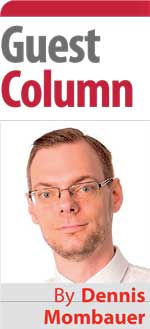Wednesday Feb 18, 2026
Wednesday Feb 18, 2026
Wednesday, 21 September 2022 00:20 - - {{hitsCtrl.values.hits}}

Climate action is urgently needed, but it needs to be informed by evidence, different forms of knowledge, and the best available science
 Human activity is causing climatic changes on a scale that is unprecedented in human history. The impacts of this changing climate can be felt on the global, national, and local level, cascading across supply chains, markets, ecosystems, and natural resource flows. Already, they include devastating extreme weather events, sea level rise, ecosystem degradation, soil depletion, and other medium- or long-term processes that affect human livelihoods, lives, and wellbeing.
Human activity is causing climatic changes on a scale that is unprecedented in human history. The impacts of this changing climate can be felt on the global, national, and local level, cascading across supply chains, markets, ecosystems, and natural resource flows. Already, they include devastating extreme weather events, sea level rise, ecosystem degradation, soil depletion, and other medium- or long-term processes that affect human livelihoods, lives, and wellbeing.
It is evident that action is needed, but also that it needs to be informed by science and driven by the findings of researchers as well as local, traditional, and Indigenous knowledge. The recent reports by the Intergovernmental Panel on Climate Change (IPCC) highlighted the deep interconnections between climate systems, ecological systems, and human systems, which lead to very complex and compound risks that are cross-sectoral and cross-regional in nature. Therefore, robust and up-to-date information is needed to ensure that planning processes and interventions address the core of the issue, avoid negative side-effects, and harness powerful synergies.
United in science
The World Meteorological Organization (WMO) has just published a new report, “United in Science 2022,” which brings together key findings from global organisations—such as WMO itself, the United Nations Environment Programme, or the IPCC—to offer an update on the state of climate science and recent developments. It aims to compile the most recent science related to climate change, impacts and responses and unify global efforts across several pivotal scientific fields.
In the introduction, the WMO’s Secretary-General highlights the urgency of evidence-based action in stark words: “The science is unequivocal: we are going in the wrong direction.” What does that mean, and how can the direction be changed? For one, countries—particularly developed countries with high emissions—need to reduce their greenhouse gas (GHG) emissions and further scale up ambition for climate change mitigation. The report finds that GHG concentrations in the atmosphere have now returned to pre-pandemic levels and continue to rise, leading to increasing global surface temperatures and other climatic changes. In fact, the recent seven years (2015-2021) have been the warmest on record, and there is a 93% chance that at least one of the next five years will be even hotter.
Regarding the Paris Agreement and its goals, there is an almost even chance (48%) that annual mean temperatures will breach the threshold of 1.5 degrees Celsius above pre-industrial temperatures within the next five years, even if only temporarily. Parties to the Paris Agreement had agreed in 2015 to hold “the increase in the global average temperature to well below 2°C above pre-industrial levels and [pursue] efforts to limit the temperature increase to 1.5°C.” To still achieve this target, it is now more vital than ever for big emitters to drastically cut GHG emissions and for developing countries to focus on green, clean, and climate-smart development pathways.
Using evidence to act
The report points out that the current mitigation pledges of all parties to the Paris Agreement, even if fully implemented, would not be enough to keep global warming below 1.5 degrees Celsius. In fact, the ambition of these pledges would need to be seven times higher to achieve this, and four times higher to at least keep warming below 2 degrees Celsius compared to pre-industrial levels. “Without ambitious action,” states the report, “the physical and socioeconomic impacts of climate change will be devastating. Irreversible physical changes in the climate system”—so-called tipping points—”cannot be ruled out and could have significant global and regional consequences.”
If emissions are not reduced, countries, economies, and communities around the world will feel the impacts, but they will not be equally affected. As outlined in the WMO report, it will be “the world’s most vulnerable populations that will suffer the most,” including the populations of developing countries like Sri Lanka, the impoverished, women, children, youth, the elderly, those with special needs, Indigenous communities, and many other groups.
Therefore, it is critical to manage climate risks and proactively adapt to the climatic changes projected by science. Based on projections and different scenarios, the present and future impacts of climate change can be mainstreamed into planning processes to make sure that every action—for instance infrastructure development, value chain enhancement, or entrepreneurship support—is climate-proofed, resilient, and able to adapt to changing circumstances.
This can include traditional risk management measures, such as reducing exposure, minimising risks, or strengthening early warning systems, but also a range of adaptive measures and ways to mobilise finance through various instruments, including insurance, climate bonds, or debt-for-climate swaps. Climate science can identify expected impacts and climate-related risks, which can then be addressed in planning and implementation processes to protect people, assets, and incomes.
“The science is clear – urgent action is needed to mitigate emissions and adapt to our changing climate.” This includes accelerating emission reduction and clean development but also investing in risk management, adaptation, and resilience-building. Researchers and other data providers can play an important role to ensure that actions on all levels are evidence-based and effective, that they benefit those who are most at risk, and that finance flows to the vulnerable and is utilised in ways that are based on the best available science.
(The writer works as Director – Research and Knowledge Management at SLYCAN Trust, a non-profit think tank based in Sri Lanka. His work focuses on climate change, adaptation, resilience, ecosystem conservation, just transition, human mobility, and a range of related issues. He holds a Master’s degree in Education from the University of Cologne, Germany and is a regular writer to several international and local media outlets.)